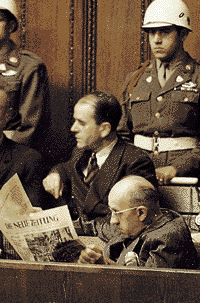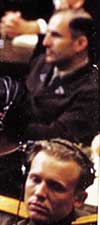Source: Hans Fritzsche's Nuremberg memoirs The Sword in the Scales, contributed by a visitor to this Website |
From the Nuremberg Trial memoirs of Reich press chief, Hans Fritzsche
Dodd now dropped the pleasant subject of Puhl and steered the conversation to the subject of the gold reserves of the Reichsbank, the stocks of bullion immediately available at different times and the various fluctuations of the reserve funds. At the end of this thoroughly technical and friendly conversation the prosecutor asked quite casually if the Reichsbank had had any special relations with the S.S. "None that I can think of," said the Bank's last President. Then the genial Mr. Dodd became a little more insistent. Would Funk please think again, exert his memory? Funk did so and finally remembered that the S.S. central accounts department did, indeed, maintain a deposit account and a safe in the Reichsbank. Dodd interrupted with a casual question as to whether it was customary to have gold teeth deposited in the Reichsbank? "No, it was not customary." "Well, I will now show you a film taken by the Allies when they first entered premises belonging to the Reichsbank." Funk was shepherded back to the dock, the lights were extinguished, and we saw projected on the screen before us the horrible pictures of what the Americans found in the strong-room of the Frankfurt offices of the Reichsbank. We saw soldiers enter the building and the big safes swing open. Huge, tightly packed bags with the imprint Deutsche Reichsbank dropped to the floor; powerful men needed all their strength to lift them on to tables. Then the seals were solemnly broken and the contents poured out: rings, bracelets, ear-rings, trinkets; jewellery of every conceivable kind from simple brooches to great tiaras, coins, banknotes, studs, sleeve-links, and above all false and gold-capped teeth in their thousands. And in the midst of this fantastic booty in this nightmare of a thieves' kitchen we saw again and again the emblems of the state we had all served and the clear imprint Deutsche Reichsbank. We sat flabbergasted. The lights were switched on and Dodd went back to the rostrum to confirm that this film had been made immediately after the Allied occupation of Frankfurt on Main. Anyone could verify the details by looking at the official minutes of the meeting of 7th May, 1946. Funk tottered from the dock to the witness chair. He was completely shattered. He confirmed that he did know about the S.S. safe deposit and clearly remembered the formalities of its establishment. But, of course, he knew nothing whatever about the contents of the deposit. No bank bothers about the exact articles a client chooses to put in the safe he has hired. But what he found entirely inexplicable was the presence of the big bags with the imprint Deutsche Reichsbank; bags of this kind were never handed to safe deposit holders. Then the Prosecution struck again. It produced an affidavit signed by Reichsbank director Puhl, the very man whose reliability Funk had so amply and generously confirmed. This affidavit had evidently been signed after a showing of the film we had just seen. The text of this document seemed a subject of dispute; the Prosecution's interpretation of it was that Funk, after having accepted the S.S safe deposit account, had then instructed Puhl not to bother about the contents stored with the bank by that organisation. It was by no means impossible to assume on the strength of Puhl's statement that Funk had known all about the horrible robbery and had acted as a sort of fence. Moreover the Prosecution now produced further evidence of fantastic dealings, such as an offer by the Reichsbank to the Berlin Municipal pawn-shops for the 'most advantageous disposal of a collection of rings, ear-rings, brooches, bracelets, pearls, diamonds, etc.' -- an official document signed in 1942. Yet another paper seemed to indicate that these appalling business-deals were transacted on behalf of the Minister of Finance. Then the Prosecution struck a third blow. It recalled to the accused his mental breakdown and tearful confession after his arrest a year before and reminded him of the full and detailed confession made by Hoss; then he advised him to search his heart and his conscience. We all wondered at this stage whether we were about to witness the collapse of the defendant in open court; there seemed every reason to suppose that we should. But this apparently feeble man, still very ill, and deeply shaken by what seemed overwhelming evidence did not break down. Indeed he seemed to display more firmness than we had yet seen him show in court as he stated in a solemn and subdued voice that he had been ignorant of the contents of the safe-deposit, and that if Puhl has said otherwise he would have to answer for it before God and his own conscience; for it was not true. Funk's counsel asked for Puhl to be called for cross-examination. I suppose that in the eyes of the people present in that crowded hall the accused was already a hopelessly beaten man when he made his way back to his seat in the dock. None of us had any idea where a chink might be found in the seemingly flawless evidence the Prosecution had produced. Yet we were all of us quite certain that Funk had spoken the truth. It would have been physically impossible for him to sustain the ordeal of that cross-examination without a clear conscience. A few days later Puhl took his place on the witness-stand. He appeared as a free man and when, first questioned by the Prosecution, briefly confirmed his affidavit. Dr. Sauter, Funk's counsel, then proceeded to cross-examine and asked him to elucidate his affidavit. Counsel wanted to know its precise significance. This produced a considerable surprise: Puhl testified that he had never wished to claim - nor indeed had he in so many words - that the defendant was aware of the contents of the safe deposit. As the lawyer's questions probed into the past circumstances and technical details of the bank's transactions with the S.S. the apparent contradictions in the statements of the two directors began to dissolve and the differences between the present witness and the accused grew less. Now Mr. Dodd stepped up to the rostrum and wished to know with whom Puhl had spoken during the last few days.
Dr. Sauter then rose to ask: 'Did you speak to me as well'' 'No, I didn't. I see you here today for the first time in my life.' As I returned to gaol that evening I happened to glance at the door of the cell next to mine. It was No. 31 and had been vacant since Raeder had been moved to the south wing; now it appeared once again to be tenanted. Right over the spy-hole I could see a brand new name-plate: 'Puhl'. Puhl was held in the Nuremberg prison for about a year at the end of which he appeared in the dock at the 'Wilhelmstrasse' trial. However, the Allies were not very lucky with this man, who, though he looked not unlike Funk, had a great deal more calm tenacity. At the Wilhelmstrasse trial Puhl got an official of the Frankfurt branch of the Reichsbank to testify on his behalf. The witness declared under oath that at the time of the city's occupation by American troops the strong-room and all the safes of the bank had been completely empty; and were so when he had handed them over to the Occupation Authorities. The witness was then questioned about the film, which,
according to Mr. Dodd's statement had been made immediately
after the occupation of Frankfurt. To this he answered that
he knew all about it because he had been personally present
during its production. A few days after the occupation some
U.S. lorries had pulled up at the door of the branch and the
manager requested to hand over Reichsbank bags which were
then filled with gold teeth,
jewellery, etc. taken from the lorries and put in the empty
safes. After these safes had been filled cameramen
appeared and made a film of their contents.
|
The significant difference between this account and the one on our website is that the claims about the faking of the film were made by Puhl's witness, and not by Puhl himself. |
 Pictures
from David Irving: Nuremberg, the Last Battle
Pictures
from David Irving: Nuremberg, the Last Battle 'To
Dr. Kempner.'
(right)
'To
Dr. Kempner.'
(right)